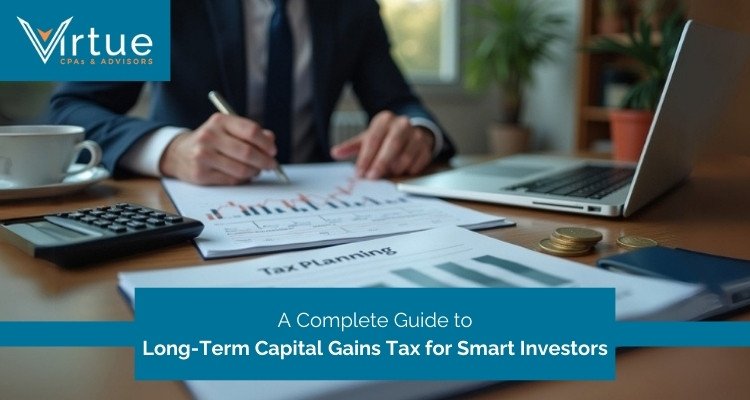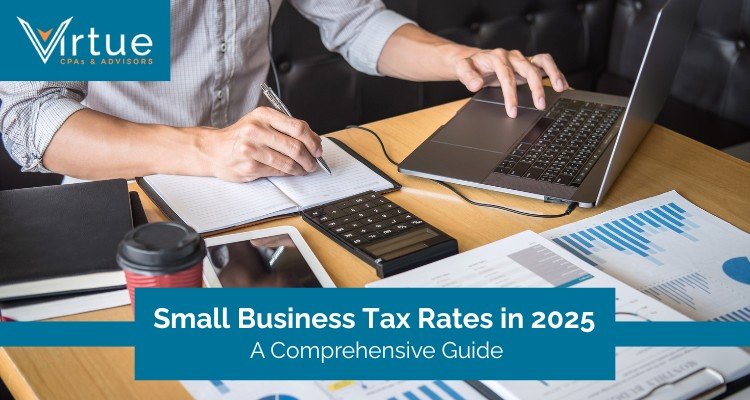In the world of investing, few factors impact your bottom line as much as taxes. And when it comes to investment-related taxes, understanding long-term capital gains is essential for maximizing your returns and building wealth efficiently.
As an investor, you make countless decisions—what to buy, when to sell, and how to structure your portfolio. But without a clear grasp of how long-term capital gains tax works, you might be missing out on significant tax savings.
This guide breaks down everything you need to know about long-term capital gains tax—from the basics to advanced strategies—to help you keep more of your profits.
What is Long-Term Capital Gains Tax?
When you sell a capital asset held for more than a year, the profit is classified as a long-term capital gain. These gains are taxed at preferential rates, lower than ordinary income, offering a substantial advantage to long-term investors.
A capital asset includes anything you own for personal use or investment purposes—such as stocks, bonds, mutual funds, real estate, and cryptocurrency.
The IRS separates short-term and long-term gains to incentivize patient investing. This distinction is one of the most powerful tax advantages available to individual investors, yet many fail to leverage it effectively.
Why Should Investors Care About Long-Term Capital Gains?
The answer is simple: because the IRS rewards patience.
By holding investments longer than 12 months, you benefit from lower tax rates—typically 0%, 15%, or 20% depending on your income. For comparison, short-term capital gains are taxed at your ordinary income tax rate, which can be as high as 37% for high earners.
This tax advantage is one of the most effective ways to legally minimize your tax burden and maximize your after-tax returns. Consider this: an investor in the highest tax bracket who sells an investment after 11 months might pay nearly twice the tax compared to waiting just one more month.
For a $10,000 gain, the difference could be paying $3,700 versus $2,000—a $1,700 savings simply by being patient. That's why successful investors often say, “It's not what you earn, but what you keep that matters.”
How is Long-Term Capital Gains Tax Calculated?
The formula for calculating capital gains is straightforward:
Sale Price - Cost Basis = Capital Gain
Your cost basis is typically what you paid for the asset, plus any costs associated with the purchase (like commissions or fees). If you held the asset for more than a year, that gain qualifies as long-term.
Then, the applicable tax rate is applied based on your taxable income. It's important to note that your capital gains themselves can push you into a higher tax bracket, which is why timing your gains is such an important strategy.
What are the 2024 Long-Term Capital Gains Tax Rates?
Understanding the current tax rates is essential for effective planning. For 2024, the long-term capital gains tax rates are:
For 2024, the long-term capital gains tax rates are:
| Tax Rate | For Single Filers | For Married Filing Jointly | For Heads of Households |
|---|---|---|---|
| 10% | $0 to $11,925 | $0 to $23,850 | $0 to $17,000 |
| 12% | $11,925 to $48,475 | $23,850 to $96,950 | $17,000 to $64,850 |
| 22% | $48,475 to $103,350 | $96,950 to $206,700 | $64,850 to $103,350 |
| 24% | $103,350 to $197,300 | $206,700 to $394,600 | $103,350 to $197,300 |
| 32% | $197,300 to $250,525 | $394,600 to $501,050 | $197,300 to $250,500 |
| 35% | $250,525 to $626,350 | $501,050 to $751,600 | $250,500 to $626,350 |
| 37% | $626,350 or more | $751,600 or more | $626,350 or more |
These thresholds adjust annually for inflation, so staying current is key when planning investment sales.
What Qualifies as a Capital Asset?
Capital assets encompass a wide range of investments and properties:
- Stocks and bonds
- Real estate properties (both residential and commercial)
- Cryptocurrency
- Mutual funds and ETFs
- Business interests
- Collectibles (art, antiques, coins, etc.)
It's worth noting that the treatment of collectibles differs from other capital assets. Gains from collectibles held long-term are taxed at a higher rate of 28%, regardless of your income level.

Common Questions Investors Ask About Capital Gains Tax
How long do I need to hold to qualify for long-term treatment?
To qualify for long-term capital gains treatment, you must hold the asset for more than 12 months. The holding period begins the day after you acquire the asset and includes the day you dispose of it. For example, if you purchased stock on April 10, 2024, you would need to sell it on or after April 11, 2025, to qualify for long-term capital gains treatment.
What is the difference between short-term and long-term gains?
Short-term capital gains: These result from selling assets held for one year or less. They're taxed at your ordinary income tax rate, which ranges from 10% to 37% depending on your tax bracket.
Long-term capital gains: These come from selling assets held for more than one year. They're taxed at preferential rates of 0%, 15%, or 20%, depending on your taxable income.
For smart investors, the long-term route often means significantly higher returns after tax, especially for those in higher income brackets.
Can losses offset my gains?
Yes, this strategy is known as tax-loss harvesting, and it's one of the most powerful tools in an investor's tax toolkit.
You can offset capital gains with capital losses dollar for dollar. If your losses exceed your gains, you can deduct up to $3,000 from your ordinary income annually. Any remaining losses can be carried forward to future tax years indefinitely.
This means that even investments that didn't work out as planned can still provide tax benefits that enhance your overall returns.
How to Qualify for Long-Term Capital Gains Treatment
The rules for qualifying for long-term treatment are straightforward, but must be followed precisely:
- 1. Hold your asset for more than 12 months (not just a calendar year)
- 2. Count from the day after you acquired it
- 3. Sell on or after the 366th day (367th in leap years)
This timing qualifies your gains for the lower tax rate. It's crucial to keep accurate records of purchase dates, as even a one-day error could result in short-term treatment and significantly higher taxes.
Strategic Ways to Legally Reduce Your Long-Term Capital Gains Tax
Smart investors don't just understand the rules—they strategically use them to minimize their tax burden. Here are effective strategies to consider:
1. Hold assets longer than a year
The simplest strategy is often the most effective. By extending your holding period beyond 12 months, you automatically qualify for lower tax rates.
2. Use tax-loss harvesting
Strategically selling underperforming investments to realize losses can offset gains from your winners. This doesn't mean you have to abandon an investment thesis—you can typically replace the sold asset with a similar (but not “substantially identical”) investment to maintain your market exposure while capturing the tax benefit.
3. Invest through tax-advantaged accounts
Utilizing accounts like Roth IRAs, traditional IRAs, and 401(k)s allows your investments to grow without generating taxable events. While these accounts have their own rules and limitations, they can be powerful tools for tax-efficient investing.
4. Gift appreciated assets to family members
If you have family members in lower tax brackets, gifting appreciated assets to them before they're sold can result in a lower overall tax burden. The recipient generally inherits your cost basis, but may pay a lower tax rate when they sell.
5. Donate appreciated assets to charity
Donating appreciated assets directly to qualified charities allows you to avoid capital gains tax entirely while still receiving a tax deduction for the full market value of the asset (subject to certain limitations).
6. Time your sales strategically
Plan major asset sales during years when your income is lower, potentially qualifying you for lower capital gains tax rates. This might be during retirement, a sabbatical, or after a job change.
7. Consider opportunity zone investments
Investing capital gains in Qualified Opportunity Zones can defer and potentially reduce your tax liability while supporting economic development in distressed communities.
Special Considerations for Real Estate and Long-Term Capital Gains
Real estate investments have unique capital gains rules that can provide significant advantages:
- Primary residence exclusion: You may exclude up to $250,000 ($500,000 if married filing jointly) in capital gains from the sale of your primary residence
- Qualification requirements: You must have owned and used the home as your main residence for at least 2 of the 5 years before the sale
- Frequency limitation: This exclusion can generally only be used once every two years
- Depreciation recapture: For rental properties, previously claimed depreciation is recaptured and taxed at a rate of 25% when the property is sold
Additionally, real estate investors can utilize 1031 exchanges to defer capital gains tax by reinvesting proceeds from one investment property into another like-kind property.
Cryptocurrency and Long-Term Capital Gains
The IRS treats cryptocurrency as property, not currency. This classification has important implications:
- Every sale or exchange of cryptocurrency is a taxable event
- Mining, staking rewards, and airdrops are generally taxable as ordinary income when received
- Holding crypto for more than a year before selling qualifies for long-term capital gains rates
- Trading one cryptocurrency for another is a taxable event, not a like-kind exchange
Proper record-keeping is especially crucial for crypto investors, as exchanges may not provide complete tax documentation. Tracking your cost basis and holding period for each transaction is essential for accurate tax reporting.

When and How You Pay Long-Term Capital Gains Tax
Long-term capital gains are reported on Schedule D of your annual tax return (Form 1040). However, the timing of your actual tax payment may vary:
- If you have significant capital gains during the year, you may need to make estimated tax payments quarterly to avoid underpayment penalties
- Employers do not withhold taxes for capital gains as they do for regular income
- If you're selling real estate, the settlement agent may be required to withhold a portion of the proceeds for taxes (though exemptions may apply)
Staying compliant with these requirements helps you avoid unnecessary penalties and interest charges.
State-Level Capital Gains Taxes
Your tax obligation doesn't end with federal taxes. Most states also tax capital gains, though the rates and rules vary significantly:
- Some states like California tax capital gains as ordinary income, with rates as high as 13.3%
- Nine states, including Florida, Texas, and Nevada, have no state income tax and therefore no state capital gains tax
- Other states offer reduced rates or partial exclusions for capital gains
This variation makes your state of residence an important factor in your overall investment tax strategy. For high-net-worth individuals, the difference can be substantial enough to influence relocation decisions.
The Net Investment Income Tax (NIIT): An Additional Consideration
High-income investors face an additional 3.8% tax on investment income as per the Affordable Care Act, including capital gains. This Net Investment Income Tax applies if your modified adjusted gross income (MAGI) exceeds:
- $200,000 for single filers
- $250,000 for married couples filing jointly
- $125,000 for married individuals filing separately
This tax is applied in addition to your regular capital gains tax, effectively creating a top long-term capital gains rate of 23.8% for high earners.
International Investors and U.S. Capital Gains Tax
Non-U.S. investors face different rules regarding capital gains:
- Nonresident aliens generally aren't subject to U.S. capital gains tax on stocks, bonds, and other personal property
- An exception applies if the gains are effectively connected with a U.S. trade or business
- Real estate investments in the U.S. are subject to FIRPTA (Foreign Investment in Real Property Tax Act) rules
- Tax treaties between countries may modify these general rules
International investors should work with tax professionals who understand both U.S. tax law and the tax treaties relevant to their country of residence.
What Smart Investors Should Ask Their CPA About Capital Gains Tax
Working with a qualified tax professional can help you optimize your investment strategy. Here are key questions to discuss:
- Can I structure my portfolio for better tax efficiency?
- How do my investment gains affect my overall tax bracket and potential NIIT liability?
- Is now the right time to realize gains, or should I wait?
- Are there better investment vehicles for deferring or reducing gains?
- How can I coordinate my investment tax strategy with my retirement planning?
- What documentation should I maintain for my investment transactions?
At Virtue CPAs, these are the kinds of questions we help our clients answer daily, developing personalized strategies that align with both tax efficiency and investment goals.
Why Work with a CPA for Long-Term Capital Gains Planning
Capital gains tax planning isn't just about understanding the current rules—it's about strategically applying them to your specific situation while anticipating future changes.
- Working with a knowledgeable CPA helps you:
- Identify the optimal timing for buying and selling investments
- Reduce your effective tax rate through proper planning
- Ensure all compliance and reporting requirements are met accurately
- Integrate your investment tax strategy with your overall financial plan
- Stay current with changing tax laws and regulations
The right tax professional becomes a valuable partner in your wealth-building journey, often saving you far more than their fee.
How Virtue CPAs Helps Investors
At Virtue CPAs, we go beyond traditional tax preparation to provide proactive guidance for investors. Our team helps clients:
- Plan capital gains events strategically across multiple tax years
- Understand complex IRS rules in plain language
- Optimize returns through tax-efficient investment strategies
- Coordinate with financial advisors to ensure alignment between investment and tax plans
Whether you're in Atlanta or anywhere across the U.S., we bring professional tax planning to investors who understand that managing taxes is just as important as managing investments themselves.
Final Thoughts
Long-term capital gains tax doesn't have to be a mystery or a burden. With proper planning and expert guidance, you can use the tax code to your advantage, keeping more of your investment returns and building wealth more efficiently.
The most successful investors understand that it's not just about what investments you choose—it's about how you structure those investments, when you realize gains and losses, and how you navigate the complex tax landscape.
Want to keep more of your investment gains? Connect with Virtue CPAs and let’s design a tax strategy that works for your future.







